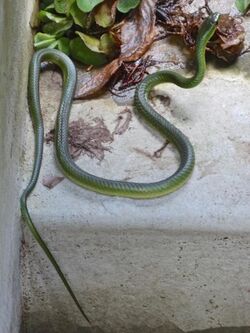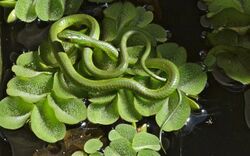Biology:Philothamnus battersbyi
| Philothamnus battersbyi | |
|---|---|

| |
| adult | |

| |
| juvenile | |
| Scientific classification | |
| Domain: | Eukaryota |
| Kingdom: | Animalia |
| Phylum: | Chordata |
| Class: | Reptilia |
| Order: | Squamata |
| Suborder: | Serpentes |
| Family: | Colubridae |
| Genus: | Philothamnus |
| Species: | P. battersbyi
|
| Binomial name | |
| Philothamnus battersbyi Loveridge, 1951[2]
| |
| Synonyms[2] | |
| |
Philothamnus battersbyi, also known commonly as Battersby's green snake, is a species of snake in the family Colubridae. The species is native to northeastern Africa.
Etymology
The specific name, battersbyi, is in honor of British herpetologist James Clarence Battersby (1901–1993).[3]
Geographic range
P. battersbyi is found in Ethiopia, Kenya, Somalia, Sudan, Tanzania, and Uganda.[2]
Habitat
P. battersbyi is found in a variety of natural habitats close to water, including forest, savanna, grassland, and freshwater wetlands, at altitudes from sea level to 2,600 m (8,500 ft).[1] It has also been found in polluted streams in major cities.[1]
Description
The holotype of P. battersbyi, an adult female, has a snout-to-vent length (SVL) of 76.2 cm (30.0 in) and a tail length of 28.3 centimetres (11.1 in).[4]
Behavior
P. battersbyi is arboreal[1][2] and diurnal.[1]
Diet
P. battersbyi preys upon amphibians, which may include caecilians, frogs, and toads.[1]
Reproduction
P. battersbyi is oviparous.[2] Clutch size is 3–11 eggs. Some communal nesting has been observed, with as many as 40 adult females laying over 100 eggs together in one nest.[1]
References
- ↑ 1.0 1.1 1.2 1.3 1.4 1.5 1.6 Howell K, Msuya CA, Ngalason W (2021). "Philothamnus battersbyi ". The IUCN Red List of Threatened Species 2021: https://dx.doi.org/10.2305/IUCN.UK.2021-2.RLTS.T20878682A20878687.en. Accessed on 29 December 2022.
- ↑ 2.0 2.1 2.2 2.3 2.4 Philothamnus battersbyi at the Reptarium.cz Reptile Database. Accessed 2020-06-06.
- ↑ Beolens, Bo; Watkins, Michael; Grayson, Michael (2011). The Eponym Dictionary of Reptiles. Baltimore: Johns Hopkins University Press. xiii + 296 pp. ISBN:978-1-4214-0135-5. (Philothamnus battersbyi, p. 19).
- ↑ Loveridge (1951).
Further reading
- Chippaux J-P, Jackson K (1951). Snakes of Central and Western Africa. Baltimore: Johns Hopkins University Press. 448 pp. ISBN:978-1421427195.
- Lanza B (1990). "Amphibians and reptiles of the Somali Democratic Republic: check list and biogeography". Biogeographia 14: 407–465. (Philothamnus battersbyi, p. 439).
- Loveridge A (1951). "On Reptiles and Amphibians from Tanganyika Territory Collected by C. J. P. Ionides". Bulletin of the Museum of Comparative Zoölogy at Harvard College 106 (4): 175–204. (Philothamnus irregularis battersbyi, new subspecies, pp. 190–191).
- Spawls S, Howell K, Hinkel H, Menegon M (2018). Field Guide to East African Reptiles, Second Edition. London: Bloomsbury Natural History. 624 pp. ISBN:978-1472935618. (Philothamnus battersbyi, p. 485).
Wikidata ☰ Q3017365 entry


